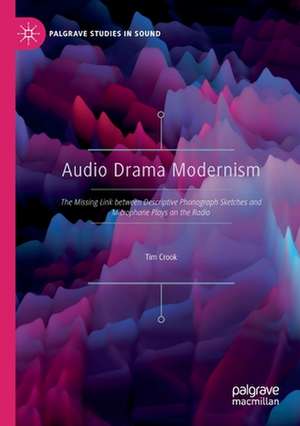Audio Drama Modernism: The Missing Link between Descriptive Phonograph Sketches and Microphone Plays on the Radio: Palgrave Studies in Sound
Autor Tim Crooken Limba Engleză Paperback – 20 noi 2021
| Toate formatele și edițiile | Preț | Express |
|---|---|---|
| Paperback (1) | 641.71 lei 6-8 săpt. | |
| Springer Nature Singapore – 20 noi 2021 | 641.71 lei 6-8 săpt. | |
| Hardback (1) | 645.79 lei 6-8 săpt. | |
| Springer Nature Singapore – 20 noi 2020 | 645.79 lei 6-8 săpt. |
Preț: 641.71 lei
Preț vechi: 754.95 lei
-15% Nou
Puncte Express: 963
Preț estimativ în valută:
122.79€ • 128.20$ • 101.62£
122.79€ • 128.20$ • 101.62£
Carte tipărită la comandă
Livrare economică 04-18 aprilie
Preluare comenzi: 021 569.72.76
Specificații
ISBN-13: 9789811582431
ISBN-10: 9811582432
Pagini: 339
Ilustrații: VIII, 339 p.
Dimensiuni: 148 x 210 x 24 mm
Greutate: 0.45 kg
Ediția:1st ed. 2020
Editura: Springer Nature Singapore
Colecția Palgrave Macmillan
Seria Palgrave Studies in Sound
Locul publicării:Singapore, Singapore
ISBN-10: 9811582432
Pagini: 339
Ilustrații: VIII, 339 p.
Dimensiuni: 148 x 210 x 24 mm
Greutate: 0.45 kg
Ediția:1st ed. 2020
Editura: Springer Nature Singapore
Colecția Palgrave Macmillan
Seria Palgrave Studies in Sound
Locul publicării:Singapore, Singapore
Cuprins
Chapter 1 Introduction.- Chapter 2 Audio Drama and Modernism—Gordon Lea 1926, the first manifesto.- Chapter 3 Radio Drama and the Avant-Garde—Lance Sieveking 1934, the second manifesto.- Chapter 4 The Modernist Turn in Literature and Radio Studies—how it changes understanding of the history of sound drama.- Chapter 5 Bridging Political Modernism between Descriptive Phonographs, 1920s political BBC radio drama and the 1930s agitational radio features.- Chapter 6 Modernist Phonograph Drama in a Belfast Street and a Montage on War—The sonic genius of Russell Hunting.- Chapter 7 Great War Descriptive Sketches.- Chapter 8 Angels of Mons and the Divine Service for King and Country.- Chapter 9 Are the Sound Drama Phonographs Examples of ‘Modernist’ Propaganda?.- Chapter 10 Reginald Berkeley—Pioneering Modernist Playwright and Political Radio Drama as Agitational Contemporaneity.- Chapter 11 Direct BBC censorship of modernist texts by D.G Bridson and his negotiation with Joan Littlewood and Olive Shapley of ‘institutional containment’.- Chapter 12 Conclusions: Sound drama as political and agitational contemporaneity and modernist expression.
Notă biografică
Professor Tim Crook is an award-winning academic, playwright and journalist who specializes in investigative history projects that have social, political and cultural impact. He has been Head of Radio at Goldsmiths, University of London for 30 years, and President of the Chartered Institute of Journalists.
Textul de pe ultima copertă
Audio Drama and Modernism traces the development of political and modernist sound drama during the first 40 years of the 20th Century. It demonstrates how pioneers in the phonograph age made significant, innovative contributions to sound fiction before, during, and after the Great War. In stunning detail, Tim Crook examines prominent British modernist radio writers and auteurs, revealing how they negotiated their agitational contemporaneity against the forces of Institutional containment and dramatic censorship. The book tells the story of key figures such as Russell Hunting, who after being jailed for making ‘sound pornography’ in the USA, travelled to Britain to pioneer sound comedy and montage in the pre-Radio age; Reginald Berkeley who wrote the first full-length anti-war play for the BBC in 1925; and D.G. Bridson, Olive Shapley and Joan Littlewood who all struggled to give a Marxist voice to the working classes on British radio.
Caracteristici
Offers an engaging exploration of the interplay between politics and audio modernism, questioning the role of MI5 surveillance and vetting of creative and political agitprop BBC radio features during the 1930's Uniquely examines pioneering sound drama modernism of British record companies during the early 20th century Provides direct links to an online archive of more than 100 audio dramas made between 1904 and 1939 that are now out of copyright














